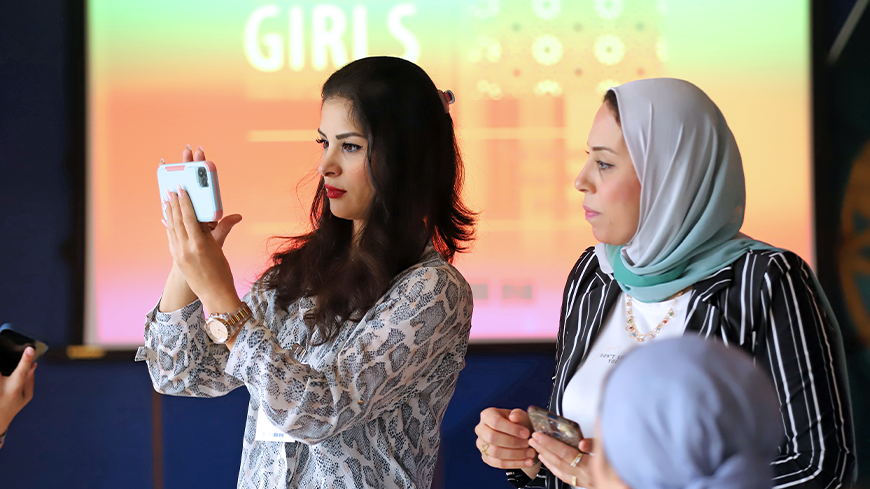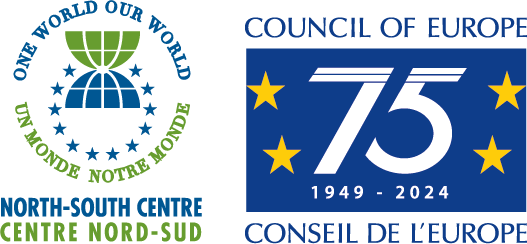On Thursday 29 June, the North-South Centre of the Council of Europe welcomed experts from civil society, governments, and international organisations in Lisbon, to discuss protection challenges and opportunities for cooperation around the issue of violence against girls in the Euro-Mediterranean region.
Under the auspices of the Representation of the European Commission in Portugal, the hybrid conference "Protecting girls: reinforcing the Euro-Mediterranean cooperation to protect girls against gender-based violence" took place both at the European Centre Jean Monnet and online bringing together more than 170 participants. In the context of the ten year anniversary of the Joint Programme between the European Union and the Council of Europe, and of the North-South Centre’s Women Empowerment programme, the event was an important milestone in the contributions of the North-South Centre to the South Programme IV: "Regional Support to Reinforce Human rights, Rule of Law and Democracy in the Southern Mediterranean" for raising awareness of the important issue of girls victims of gender-based violence in the Southern Mediterranean, as well as the crucial role of regional and multi-stakeholder cooperation.
Under the aegis of the European Commission, the Council of Europe, the Portuguese Commission for Citizenship and Gender Equality, the conference opened with key addresses of its representatives and the inspiring speech of Aryan Ashory, a young poet and human rights activist, on the obstacles and aspirations of refugee and asylum-seeking girls.
Organised around two sessions, the conference provided an overview of the situation of girls and the forms of gender-based violence they specifically face. The first session on prevention and protection measures included contributions from experts from Plan International in Jordan, the National Council for Women in Egypt, the SAWA Association in Palestine*, the ECPAT network for the MENA region and RNW, an international digital media organisation. The panel warned of the increase in violence against girls, especially in the context of the pandemic in recent years. Forced marriage, female genital mutilation, domestic and sexual violence, crimes committed in the name of so-called "honour" are among the forms of violence against girls, as well as the disturbing phenomenon of cyber violence. The experts and participants concluded that there is a need to strengthen the existing legislative and legal frameworks in a comprehensive manner and through the establishment of coordinated victim referral and assistance mechanisms supported by data collection and information sharing at national level. In this regard, the allocation of adequate resources and political will are fundamental and are what is currently lacking.
The second session devoted to multi-level cooperation counted on the expertise of the Director General of Arab Women Organization (Arab League), the KARAMA network, the Portuguese High Commission for Migration, and the Tunisian organization SAWN. Promising initiatives for cooperation between civil society, governmental institutions, and regional and international organisations to achieve better protection of girls against violence. The panellists stressed the importance of intersectionality in policies regarding gender-based violence and the need to work on a holistic approach that includes all actors from public entities to address cases and risks of violence. The vulnerable situation of migrant, refugee and asylum-seeking girls was discussed, as well as the trafficking of girls were among the issues for which cross-border cooperation should imperatively be strengthened. In this regard, participants called for effective multilateral cooperation in the Southern Mediterranean region. The Arab League's draft treaty to combat violence against women aims to respond to this imperative. In this regard, a reinforcement of exchange of practices and technical co-operation between the Arab Women Organisation and the North-South Centre to achieve this goal is under development.
The effective implementation of any protection measures depends heavily on the awareness-raising and prevention activities that are carried out. The participants unanimously recognised the importance of working towards a change in mentalities to achieve a change in social norms, the very ones that maintain harmful practices against girls and prevent the reporting of violence against girls. In this spirit, and with the support of the Royal Film Commission, two short films were presented during the conference: "Diana" by Maysoon Khaled and "Children’s Games" by Rim Mejdi, which respectively tackle the issues of feminicide and sexual abuse against girls. Highlights of the conference, these films are part of the project "Chronicle of her" project supported by UN Women, UNESCO and the Royal Film Commission in Jordan.
Following the conference, the closing seminar of the regional grant programme "Strengthening the capacities of civil society organisations" allowed the project beneficiaries to take stock of their actions dedicated to improving access to protection services for victims. In total, 28 activities were organised for the benefit of 2123 stakeholders. More information is available on the project webpage: Euro-Mediterranean Cooperation for the Protection of Women and Girls against Violence (coe.int)
Find the programme and speeches of the speakers on the conference page: Protecting Girls
Relive the event through the conference’s gallery.
This conference is implemented in the framework of the programme "Regional Support to Reinforce Human rights, Rule of Law and Democracy in the Southern Mediterranean" (South Programme IV), a joint initiative, financed by the European Union and the Council of Europe and implemented by the latter, with the objective to support democratic reforms in the Southern Mediterranean region.

The views expressed in this webpage can in no way be taken to reflect the official opinion of the European Union or the Council of Europe.
* This designation shall not be construed as recognition of a State of Palestine and is without prejudice to the individual positions of Council of Europe and European Union member States on this issue.




